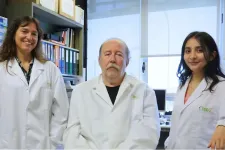Scientists identified 618 proteins linked to 19 different types of cancer, including 107 proteins in a group of people who blood was collected at least seven years before diagnosis.
The team have discovered that these proteins could be involved at the very earliest stages of cancer, where it could be prevented.
They believe that some of these proteins could be used to detect cancer much earlier than is currently possible. In the future, this could help treat the disease at a much earlier stage or prevent it altogether.
Cancer Research UK is funding researchers to look for the earliest signs of cancer as part of its long-term strategy to prevent cancer through research. In these studies, the team used a powerful technique called proteomics. Proteomics allows scientists to analyse a large set of proteins in tissue samples at a single point in time, to see how they interact with each other and find any important differences in proteins between different tissue samples.
In the first study, scientists analysed blood samples from UK Biobank which were taken from more than 44,000 people, including over 4,900 people who subsequently had a cancer diagnosis.
Using proteomics, the team analysed a set of 1,463 proteins from a single sample of blood from each person. They compared the proteins of people who did and did not go on to be diagnosed with cancer to look for important differences between them and find out which ones were linked to cancer risk. The scientists also identified 182 proteins that differed in the blood three years before a cancer diagnosis took place.
In the second study, the scientists looked at genetic data from over 300,000 cancer cases to do a deep dive into which blood proteins were involved in cancer development and could be targeted by new treatments.
The scientists found 40 proteins in the blood that influenced someone’s risk of getting 9 different types of cancer. While altering these proteins may increase or decrease the chances of someone developing cancer, the scientists also found that in some cases this may lead to unintended side-effects.
However, the team stress that they will need to do further research to find out the exact role these proteins play in cancer development, which of the proteins are the most reliable ones to test for, what tests could be developed to detect the proteins in the clinic and which drugs could target these proteins.
Dr Keren Papier, Senior Nutritional Epidemiologist at Oxford Population Health and joint first author of the first study, said:
"To save more lives from cancer, we need to better understand what happens at the earliest stages of the disease. Data from thousands of people with cancer has revealed really exciting insights into how the proteins in our blood can affect our risk of cancer. Now we need to study these proteins in depth to see which ones could be reliably used for prevention.”
Dr Joshua Atkins, Senior Genomic Epidemiologist at Oxford Population Health and joint first author of the first study, said:
“The genes we are born with, and the proteins made from them, are hugely influential in how cancer starts and grows. Thanks to the thousands of people who gave blood samples to UK BioBank, we are building a much more comprehensive picture of how genes influence cancer development over many years.
Dr Karl Smith-Byrne, Senior Molecular Epidemiologist at Oxford Population Health and a senior author of the first paper and first author of the second study, said:
“We’ve predicted how the body might respond to drugs that target specific proteins, including many potential side-effects. Before any clinical trials take place, we have some early indications of which proteins we might avoid targeting because of unintended side-effects.
“This research brings us closer to being able to prevent cancer with targeted drugs – once thought impossible but now much more attainable.”
Professor Ruth Travis, Senior Molecular Epidemiologist at Oxford Population Health and a senior author of both studies, said:
"To be able to prevent cancer, we need to understand the factors driving the earliest stages of its development. These studies are important because they provide many new clues about the causes and biology of multiple cancers, including insights into what’s happening years before a cancer is diagnosed.”
“We now have technology that can look at thousands of proteins across thousands of cancer cases, identifying which proteins have a role in the development of specific cancers, and which might have effects that are common to multiple cancer types.
Executive Director of Research and Innovation at Cancer Research UK, Dr Iain Foulkes, said:
“Preventing cancer means looking out for the earliest warning signs of the disease. That means intensive, painstaking research to find the molecular signals we should pay closest attention to.
“Discoveries from this research are the crucial first step towards offering preventative therapies which is the ultimate route for giving people longer, better lives, free from the fear of cancer.”
The papers, titled “Identifying proteomic risk factors for cancer using prospective and exome analyses of 1,463 circulating proteins and risk of 19 cancers in the UK Biobank” and “Identifying therapeutic targets for cancer among 2,074 circulating proteins and risk of nine cancers.” were published today (15th May) and 29th April respectively in Nature Communications*.
ENDS
For media enquiries to Cancer Research UK, contact Graeme Sneddon in the Cancer Research UK press office on 020 3469 5758 or, out of hours, on 020 3469 8301.
For media enquiries to Oxford Population Health, please contact communications@ndph.ox.ac.uk.
Notes to Editor
* The first paper will be available from https://www.nature.com/articles/s41467-024-48017-6 when the embargo lifts. The second paper is available from https://www.nature.com/articles/s41467-024-46834-3.
About Cancer Research UK:
Cancer Research UK is the world’s leading cancer charity dedicated to saving lives through research, influence and information.
Cancer Research UK’s pioneering work into the prevention, diagnosis and treatment of cancer has helped save millions of lives.
Cancer Research UK has been at the heart of the progress that has already seen survival in the UK double in the last 50 years.
Today, 2 in 4 people survive their cancer for at least 10 years. Cancer Research UK wants to accelerate progress and see 3 in 4 people surviving their cancer by 2034.
Cancer Research UK supports research into the prevention and treatment of cancer through the work of over 4,000 scientists, doctors and nurses.
Together with its partners and supporters, Cancer Research UK is working towards a world where people can live longer, better lives, free from the fear of cancer.
For further information about Cancer Research UK's work or to find out how to support the charity, please call 0300 123 1022 or visit www.cancerresearchuk.org. Follow us on Twitter and Facebook
END

